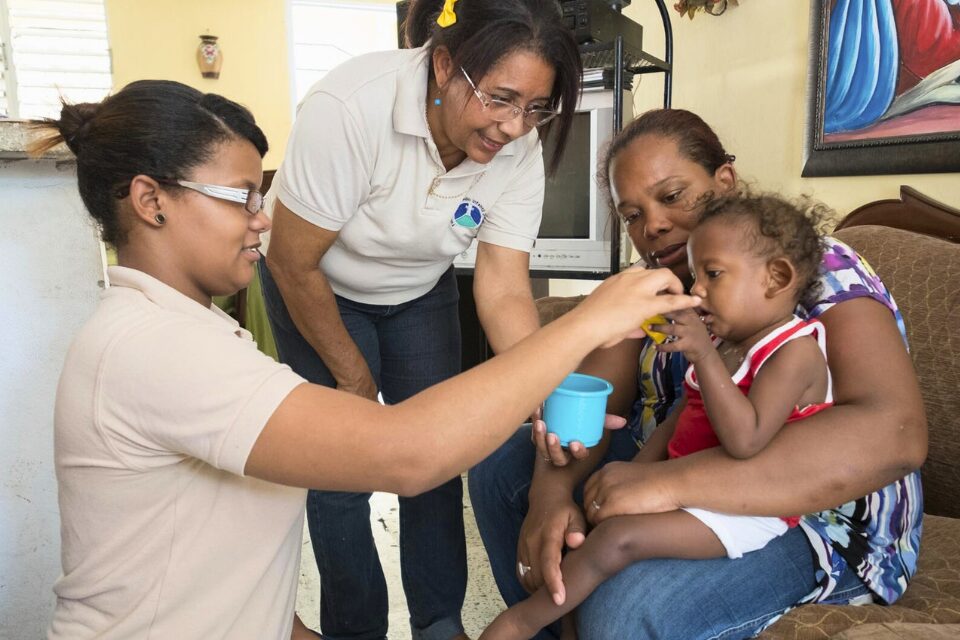Four United Methodist mission partners in Haiti give updates and encourage churches to continue support amid the current humanitarian crisis.
REV. ALICE FLEMING TOWNLEY
Elder, Michigan Conference
Haiti is in a humanitarian crisis. We are called to remember the people of Haiti with prayers and actions. Troubles have destabilized the island nation in recent years: gasoline shortages, a United Nations travel advisory, the COVID-19 pandemic, the assassination of the president in July 2021, widespread hunger, the rise of gangs, and high-power guns flowing from the United States.
On February 29, 2024, gangs closed the main airport in the capital city of Port-au-Prince and warned Prime Minister Ariel Henry not to return. Schools, roads, banks, and workplaces have closed. Government and health care systems are teetering on the edge of collapse. In his April blog, Bishop David Bard wrote, “We will pray for Haiti and work for solutions that bring peace and security to our neighbors and facilitate an end to this humanitarian crisis.”
In this critical time, we can:
-
- LEARN about the work of our EngageMI Ministry Partners in Haiti: Grace Children’s Hospital, Grace Rural Health Clinics, Jeremie Rising, and Haitian Assets for Peace International.
- ACT by including Haiti in prayers, sharing communications, and affirming the proposed annual conference legislation to commit to the people of Haiti.
- GIVE increased financial support to these ministries providing health care, education, shelter, and aid during this humanitarian crisis.
The General Board of Global Ministries of The United Methodist Church actively supports four General Advance Projects in Haiti. The Michigan Conference, in turn, continues to undergird them because of our long-term relationship and inclusion in our EngageMI program. These include:
-
- Grace Children’s Hospital, Advance #418520
- Grace Rural Health Clinics, Advance #418847
- Jeremie Rising, which is in collaboration with Next Generation (formerly the Haiti Children Project), Advance #3020507
- Haitian Assets for Peace International (HAPI), Advance #3020490
How to give financially? Churches and individuals can give online by clicking the Advance numbers above or by mailing a check along with monthly Ministry Shares to this address: Conference Ministry Shares, P.O. Box 72472, Cleveland, OH 44192-0002. Make checks payable to “Michigan Conference” and write the project name and Advance number on the memo line.
These four General Advance Projects in Haiti are still open. They are providing health care, education, and shelter and are a lifeline to many people. These programs need increased awareness and financial support “for such a time as this” (Esther 4:14, NIV).
Grace Children’s Hospital and Grace Rural Health Clinics
Grace Children’s Hospital in Port-au-Prince has provided health care and health education to children and their families for nearly 60 years. The hospital’s services include an eye clinic, maternal and newborn care, and treatment of chronic illnesses like tuberculosis and HIV/AIDS. Last year, the hospital treated 170,000 children. Grace is located between two impoverished areas and cares for all children who need care. At the time of the initial gas shortages, seven hospitals in Port-au-Prince closed. Countless more private hospitals have closed since. Grace Children’s Hospital is still open for in-patient and out-patient care.
Grace Children’s Hospital operates smaller health clinics in Jolitrou near Cap-Haitian in northwest Haiti and Las Cayes in southwest Haiti.
Grace Rural Health Clinics provides 100 mobile units to serve rural Haiti. These health care workers often drive a moped with a folding table on the back to reach remote areas. They provide treatment, promote education, and administer vaccines. Grace Children’s Hospital and Grace Rural Health Clinics offer health care that would be unavailable in many areas.
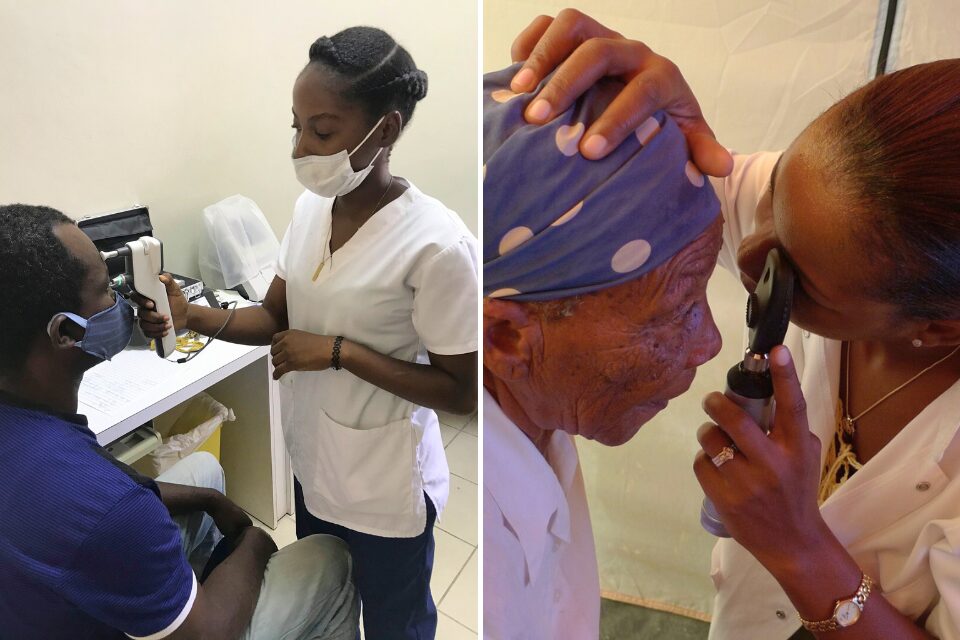
The combined board of Grace Children’s Hospital and Grace Rural Health Clinics is called International Child Care (ICC). ICC board leaders in Ann Arbor, MI, shared this week that they are in constant contact with the leadership at Grace for emotional and logistical support. According to a recent report from the United Nations food agency’s director, four million people face “acute food insecurity,” and one million are one step away from famine. Within the last year, the General Board of Global Ministries awarded ICC a grant for medical supplies and equipment. ICC ships medical supplies from the United States to Haiti through Missionary Flights International when the airport is open.
Grace Children’s Hospital and Grace Rural Health Clinics need funds for current operations and to restock medical supplies across Haiti when the airport reopens. Find stories and pictures from this ministry partner by visiting their website, International Child Care, and following their Facebook page.
Jeremie Rising, which Partners with Next Generation
John Smith and Nancy Smith co-chair the mission committee at First United Methodist Church of Birmingham, MI, and are co-founders of Jeremie Rising. Nancy worked as an intensive care nurse, and after the earthquake in 2010, she made a trip to Haiti to help the wounded. Their pastor at the time, Rev. Jack Harnish, wondered aloud if the congregation could do more. He shared that most United Methodist churches in Michigan supported Haiti in some way.
Members of Birmingham: First UMC began taking annual volunteers on mission trips and continued until 2019, when the travel advisory and the COVID-19 pandemic halted visits. Church members continued to support the work long distance through the relationships they had developed with the Haitian leaders. The team in Haiti listens to local needs, comes up with ideas, and develops budgets that leaders in the United States and Haiti review together. The Smiths started a nonprofit organization to expand support beyond Birmingham: First. When the old Jeremie Project dissolved in 2020, they contributed any funds left to Jeremie Rising.
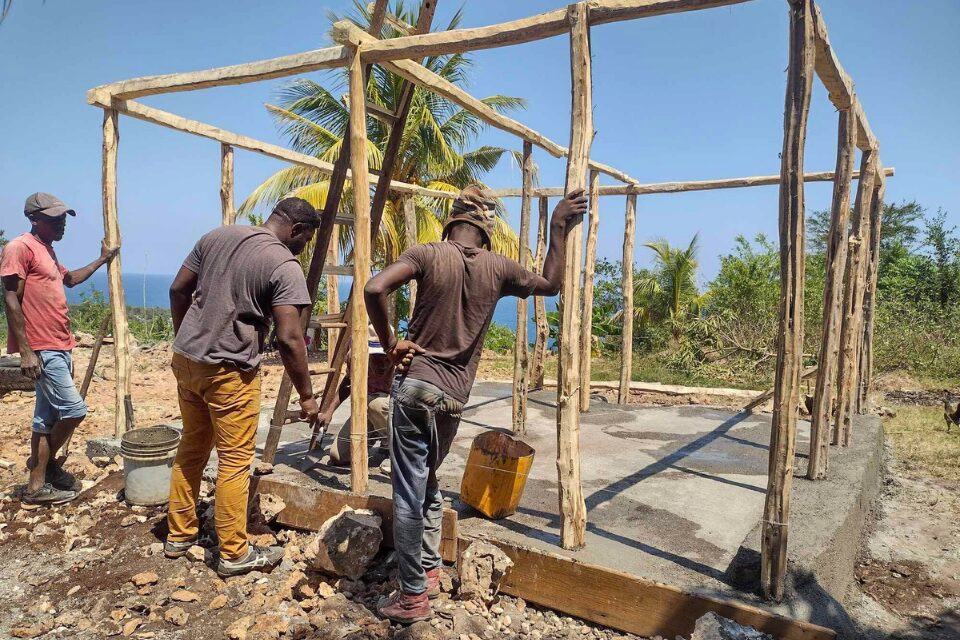
John Smith says that current conditions in Port-au-Prince are brutal because that is where gang activity is most heavily concentrated. The airport and seaport are now closed. Everyone in Haiti feels the effects of food, fuel, and water shortages and the correlated increased prices. The city of Jeremie is six to seven hours from Port-au-Prince, and the gangs have yet to come that far. Agape Flights continues to fly directly to Jeremie twice a month to deliver supplies. Jeremie Rising continues with tuition scholarships, mobile medical events, caring for two orphanages and one elder care facility, solar installations, and rebuilding churches and schools.
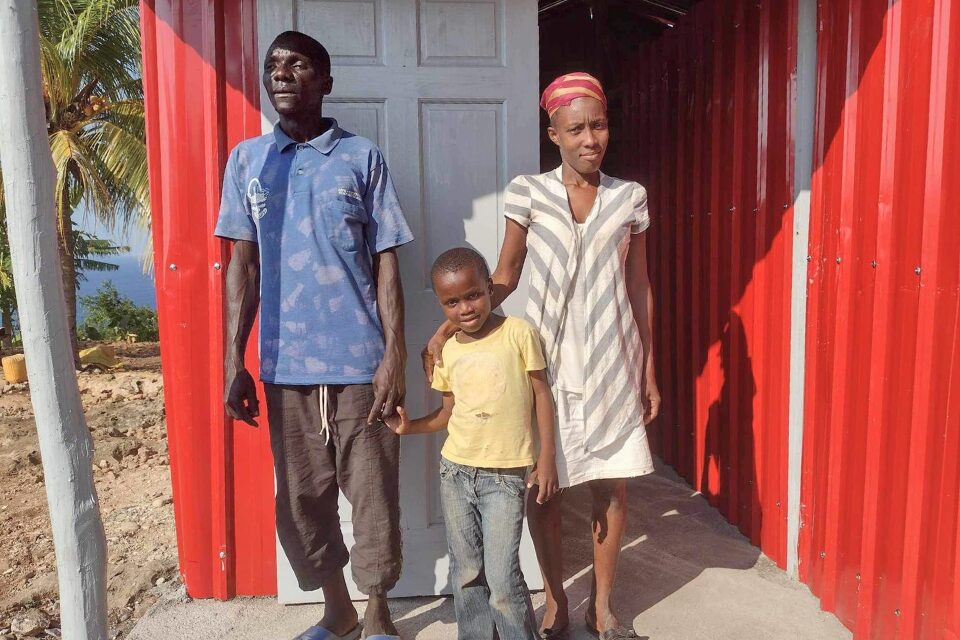
Jeremie Rising partners with Next Generation Ministries, formerly the Haiti Children Project. Together, they offer mobile medical units, orphan care in Petit Foyer in Gebo, feeding programs, and disaster relief. Currently, they are building shelter homes for families with young children experiencing homelessness. The shelter homes are made of tin, have three to four rooms, and can be built for around $3,000. Costs have doubled in the last 18 months. They hope to build 20 homes this year.
John Smith says the best way to help is to contribute money to bolster their work and stay in touch. Follow Jeremie Rising on Facebook. Funds can be given through the Advance to Jeremie Rising through Next Generation Ministries by designating accordingly.
Haitian Assets for Peace International
Haitian Assets for Peace International (HAPI) continues to provide medical care, health resources, and training in the rural community of Mizak, Haiti. Last year, 358 women enrolled in the prenatal program. Some women travel, on foot or motorcycle, to HAPI from distances greater than two hours. Of those women who delivered in a facility, 61% did so at HAPI, and 25% were referred to the hospital for high risk — the remaining women delivered at home, some because they couldn’t find transportation due to fuel shortages.
The humanitarian crisis has impacted Haiti, but women are still giving birth, and basic health needs continue, amplified by the effects of food insecurity and trauma. HAPI’s facility is the only center of care many women have within a distance of several hours of travel. The Guardian recently reported that women in Haiti are at great risk with the lack of nutrition available and the closure of most clinics and hospitals because of gang violence. One midwife said, “It is simply best not to get pregnant because the system has failed.”
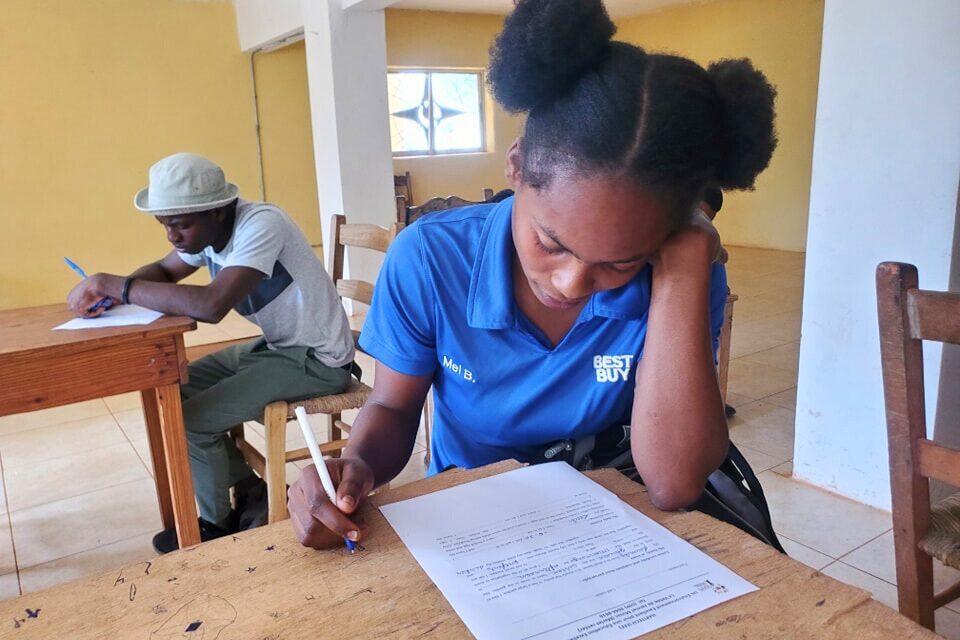
Mario Damis, the former IT Director and Coordinator of HAPITech, is now doing graduate studies in Michigan. Mario explained that many people have migrated back to Mizak because of the crisis, and the community’s needs are increasing. “Funds to strengthen and augment our services,” Mario says, “would create a better living environment.” Finance and Human Resources Director Jean Claude Gard, Jr., adds, “HAPI is a trusted presence in the community. This is an opportunity for us to expand our limited agricultural activities and provide people with seeds for crops, especially to benefit persons integrating into the community so they can nourish their families and ease the burden on host families who are struggling to house and feed them in their own time of need. People need every kind of assistance.”
Executive Director Valerie Mossman-Celestin from Hudsonville, MI, agrees. “Refugees feel encouraged when they see they can receive quality services outside of Port-au-Prince,” she says. “We need to increase our capacity to contribute to creating and sustaining vibrant rural living as a viable alternative: whether for the young person seeking a pathway out of poverty; the woman who is praying her pregnancy isn’t her death sentence; the budding entrepreneur who could create jobs; or the diaspora who want to retire in peaceful, rural Haiti but fear the lack of health services. The front of Merlet Center bears the scripture from Jeremiah 29:7: ‘Also, seek the peace and prosperity of the city to which I have carried you into exile. Pray to the Lord for it, because if it prospers, you too will prosper.’ Displaced persons are an opportunity to diversify the gifts and talents within the community and build on that vision.”
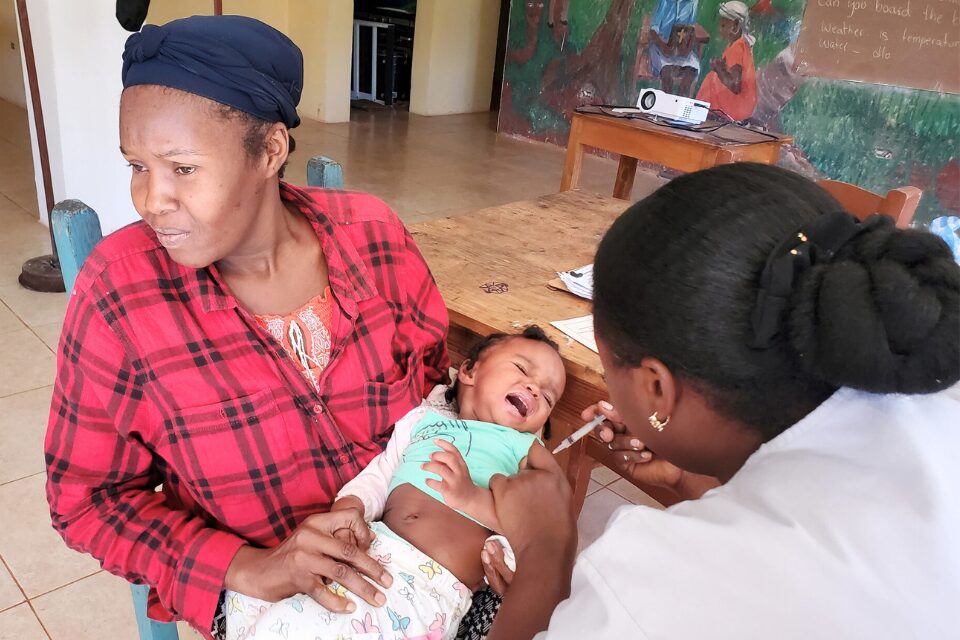
As Faith Green Timmons shared in her article on the upcoming 2024 Michigan Annual Conference, last year’s offerings from the Michigan Annual Conference helped HAPI provide 7,130 patient consultations, prenatal care for 383 pregnant women, 1,878 lab tests, and skilled training for 117 young adults. This year, the financial support of the Michigan Annual Conference offering will be crucial as HAPI’s efforts keep up with soaring inflation and escalating needs.
HAPI needs increased financial resources to meet the increased needs. Visit their website to learn more about their work in Haiti, and follow them on Facebook for the latest updates.
The Michigan Conference and Haiti — Historical Commitment and Next Steps
The former West Michigan and Detroit Conferences had covenants with the Methodist Church of Haiti (EMH) for decades. Michiganders are among the leaders of the current four General Advance Projects in Haiti. But after the travel advisory began, Volunteers in Mission teams stopped traveling to Haiti and returning home with passion and stories. In 2019, after the Haiti Hot Lunch Program was discontinued, the Michigan Conference Council on Finance and Administration voted to no longer send money to the Methodist Church in Haiti.
After an extended pause, the Michigan Conference Haiti Task Force has begun meeting again and determining a way forward. Deaconess Valerie Mossman-Celestin and Rev. Tiffany Newsom are co-chairs. The task force is bringing legislation, R#2024-5, “Commitment to the People of Haiti,” to the 2024 Michigan Annual Conference in June to renew the Michigan Conference’s commitment to Haiti and highlight the programs of the four General Advance Projects (click to review the legislation on pages 11-12).
The General Board of Global Ministries stays in contact with leaders of General Advance Projects and evaluates them according to mission, values, and fiduciary accountability. Leaders of all four projects — Grace Children’s Hospital and Grace Rural Health Clinics (ICC), HAPI, and Jeremie Rising — will be present at the 2024 Michigan Annual Conference Mission Fair on Thursday, May 29, from 7:30 to 8:30 pm, and will host a fireside chat for conversation.
If ever there was a time to partner in ministry with the people of Haiti, this is it. The Michigan Conference is uniquely positioned to respond during this humanitarian crisis. Come alongside, amplify, and strengthen what God is doing there. Now is the time to learn, act, and give!
Alice Fleming Townley is a United Methodist elder and the executive director of Fleming Townley Collaborative. She nurtures a healing presence in her work as a consultant, coach, and community organizer.
Last Updated on April 23, 2024

